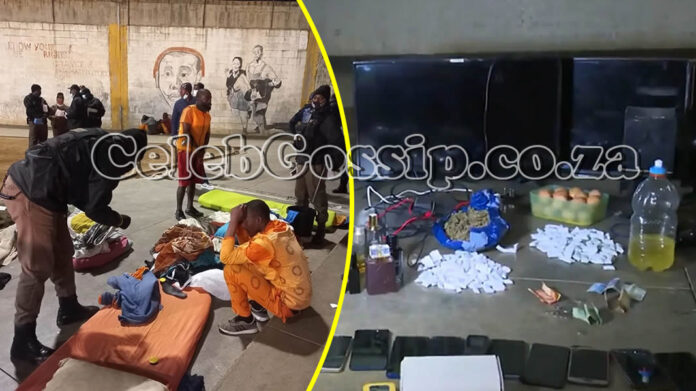Johannesburg – The infamous Johannesburg Correctional Centre, better known as Sun City, has long been whispered about in hushed tones. A place where the walls, though high, seem to offer little protection against the insidious tendrils of illicit activities. On Wednesday night, the whispers turned to shouts as authorities launched a surprise raid at the prison's Medium B section, home to over 10 000 inmates.
The operation, led by Department of Correctional Services head, Makgothi Samuel Thobakgale, saw members of the Emergency Support Team (EST) and the South African Police Service (SAPS) descend upon the facility, leaving no stone unturned in their quest to uncover the hidden world of contraband.
"We have been gathering information over a period of time and this is not the first operation. We have been doing operations for the past four weeks because we have identified the Johannesburg Correctional Management Area as a point of focus," stated Thobakgale, his voice firm and resolute.
Correctional Services' EST and SAPS officials conduct a raid at the Johannesburg prison, popularly known as Sun City.@News24#PrisonRaid pic.twitter.com/A322staNAf
— Noxolo Sibiya (@NoxieSibiya) July 24, 2024
The evidence of a thriving black market within the prison walls was stark. PlayStations, WiFi routers, manicure nail kits, designer perfumes, and even flat-screen plasma televisions were among the items seized. But it was the sheer volume of cellphones and marijuana, much of it ready for sale, that truly highlighted the extent of the problem.
"Firstly, we start with unit managers. In every unit, there is a unit manager who now needs to account for what we found here. The second thing is to tighten security especially around the movement (that is) movements to court, movements to hospitals and even movements inside the centre," Thobakgale stressed, emphasizing the need for accountability and a tightening of security measures.
The search operation itself was a spectacle of controlled chaos. Inmates, some topless and barefoot, were ordered out of their cells and herded into the assembly point, where they were forced to kneel with hands behind their heads. Each cell was meticulously searched, with EST wardens conducting thorough pat-downs and even inspecting inmates' mouths and buttocks.
The search extended to every nook and cranny of the cells, with mattresses removed, pillows ripped open, and even compartments of makeshift items scrutinized. Cellphones were found expertly hidden behind toilets, under mattresses, inside pillowcases, and even within existing electronics. Electrical cords, used to power contraband devices, were also confiscated, revealing the extent of the illicit electrical connections within the cells.
One inmate, his voice laced with fear, alerted the news crew to the danger posed by these illegal connections, recounting how he was forced back into his overcrowded cell, barefoot, to identify his belongings. "I'm scared of being electrocuted," he whispered, urging journalists to avoid touching the exposed wires.
The operation highlighted the intricate networks operating within the prison walls. "We run a system where we go through statistics and analyse the patterns of each prison. We get information from inside on the movements and the networks that are getting stronger. So, we are here to dismantle those networks," Thobakgale explained, revealing the intelligence-driven nature of the operation.
The methods of smuggling contraband into the prison are as varied as they are ingenious. Thobakgale pointed to visiting family members and friends as one source, noting that inmates who frequently attend court proceedings are particularly vulnerable to smuggling attempts. "In the first cell that we searched, those are offenders that frequent courts because some of them have further charges, so they are exposed to the outside world and when they mix during the time they get transported, they exchange these contrabands," he said.
But the ingenuity of the inmates doesn't stop there. "Some inmates keep the contrabands inside their bodies, which makes it difficult for prison officials to detect," Thobakgale acknowledged, highlighting the lengths to which inmates will go to obtain illicit items.
The raid also exposed the disturbing reality of rogue officials who collude with prisoners to facilitate the smuggling of contraband. "We are not blind to the fact that there are some officials who are assisting the prisoners," Thobakgale admitted, acknowledging the internal threat to security.
The consequences for inmates caught with contraband are severe. "This is not the last search. We will still continue," Thobakgale warned, emphasizing the ongoing nature of the crackdown. Inmates found in possession of contraband will face additional charges, potentially jeopardizing their chances of parole.
The surprise raid followed the surfacing of a video shared on TikTok by Zimbabwean national Bornface Banks, who boasted that inmates got to live for free without paying for rent, electricity, toiletries, food and education.











